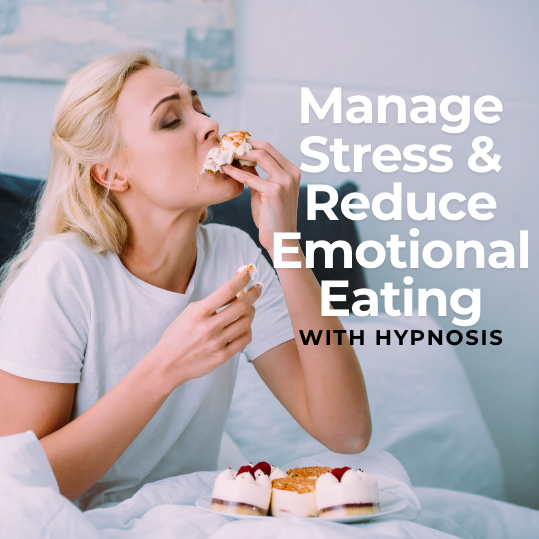Emotional eating is a common phenomenon that many individuals experience, but few fully understand. It involves consuming food as a means of coping with emotions, rather than eating in response to physical hunger. This behaviour can lead to overeating, weight gain, and a cycle of guilt and shame. In this article, we will delve into the concept of emotional eating, explore its underlying causes, and provide practical tips to help you break free from this pattern. Additionally, we will examine how hypnosis can be a powerful tool in overcoming emotional eating and fostering mindful eating habits.
Understanding Emotional Eating:
Emotional eating is a complex behaviour that is often linked to one’s emotions, rather than physiological hunger cues. It typically involves turning to food as a way to soothe or distract oneself from negative emotions such as stress, anxiety, loneliness, sadness, or boredom. In these moments, food becomes a source of comfort, leading to a temporary alleviation of emotional discomfort.
One of the key characteristics of emotional eating is the mindless consumption of food, often driven by cravings for high-calorie, sugary, or processed foods. These foods trigger the release of neurotransmitters in the brain that provide a temporary sense of pleasure and relief, reinforcing the behaviour of emotional eating.
Causes of Emotional Eating:
Emotional eating can have various underlying causes, including psychological, environmental, and social factors. Some common triggers for emotional eating include:
- Stress: High levels of stress can lead to emotional eating as a way to cope with feelings of overwhelm and anxiety.
- Emotional Trauma: Past emotional trauma or unresolved issues can manifest in emotional eating behaviours.
- Boredom: A lack of stimulation or purpose can trigger mindless eating out of boredom.
- Social Pressure: Social settings, peer influence, and societal expectations can contribute to emotional eating patterns.
- Negative Body Image: Dissatisfaction with one’s body image or self-esteem issues can lead to using food as a source of comfort.
Tips to Stop Emotional Eating:
Breaking the cycle of emotional eating requires awareness, self-reflection, and the cultivation of alternative coping mechanisms and willpower. Here are some practical tips to help you overcome emotional eating and develop healthier eating habits instead:
1. Mindful Eating: Practice mindful eating by paying attention to your hunger cues, savoring each bite, and eating slowly to fully engage with the experience of eating and stopping the minute you feel full.
- Emotional Awareness: Identify the emotions or triggers that lead you to eat emotionally. Keep a journal to track your emotions and eating patterns.
- Stress Management: Develop healthy stress-relief techniques such as meditation, yoga, deep breathing exercises, or physical activity to manage stress without turning to food.
- Healthy Distractions: Engage in activities that provide positive distractions and fulfill emotional needs, such as hobbies, exercise, socialising, or creative pursuits.
- Nutritious Choices: Stock your kitchen with wholesome, nourishing foods and plan balanced meals to support your physical and emotional well-being.
- Seek Help from a Hypnotherapist: Hypnotherapy can be a valuable tool in addressing and overcoming ingrained emotional eating patterns. By accessing the subconscious (the part of the mind where all our habits are stored), we can remove the unwanted eating habits from there, making it far easier to stop emotional eating without having to rely on willpower alone.
Last words…
In conclusion, emotional eating is a common yet complex behaviour that can have detrimental effects on one’s physical and emotional well-being. By understanding the underlying causes of emotional eating, practicing mindfulness, and implementing healthy coping strategies, individuals can break free from the cycle of emotional eating and cultivate a balanced and positive relationship with food.
Additionally, hypnotherapy offers a powerful and transformative approach to overcoming emotional eating, promoting self-awareness, and fostering mindful eating habits.
If you still need further help after following my tips, I recommend you get in touch with me to hear about my hypnosis services designed to help you overcome unwanted emotional eating in as short a time frame as possible. To find out more, follow this link – Hypnosis for Emotional Eating
I am a clinical hypnotherapist with over 15 years of expertise, and so far, I have assisted over 100 people from Poole, Bournemouth, Southampton, Bath, London, Bristol, the United States, and even New Zealand. Regardless of where you live, I am completely qualified to serve you in the same manner, so do contact me if you require my hypnosis services as well. Here’s the connection to my website, www.alexsaxton.com , and here’s the link to my calendar, wwww.alexsaxtoncalendar.as.me, if you would like to book a free consultation with me.
Disclaimer: The information provided in this blog is for educational and informational purposes only and the tips shared here are general and may not be suitable for everyone. I am not a medical doctor and the tips provided should not be considered a substitute for professional medical advice, diagnosis, or treatment for emotional eating. It is essential to differentiate between emotional eating symptoms and potential underlying medical conditions. Therefore, if you are experiencing emotional eating, it is recommended to consult with a qualified healthcare professional or a licensed medical doctor for proper evaluation and guidance first.




